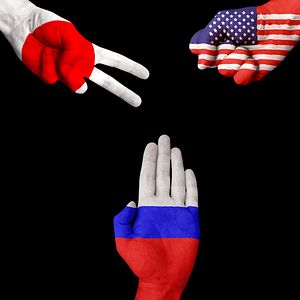The worsening split between the West and Russia over the fate of Crimea is putting some Asian nations in a tough position. India has so far refused to join in Western sanctions on Russia, but as my colleague Ankit wrote earlier, New Delhi might find itself forced to choose between Russia and the West as the standoff continues. Meanwhile, Japan, another country that has tried hard to maintain good relations with both Moscow and Washington, has decided to stand with the West.
On Monday, Japan’s Chief Cabinet Secretary Yoshihide Suga told reporters that the “Japanese government does not recognize a referendum in Crimea,” according to Reuters. As a response to Russia’s “regrettable” decision to recognize Crimean independence, Suga said that Japan will halt talks on a bilateral investment agreement and on relaxing visa restrictions. Foreign Minister Fumio Kishida made similar remarks in his March 18 press conference, where he called the Crimean referendum “legally invalid.” Kishida said that, as a response, Japan had “frozen the launch of negotiations to conclude the following three new international agreements: a new investment agreement, a space agreement and an agreement concerning the prevention of dangerous military activities.” Prime Minister Shinzo Abe has also said Japan will consider stronger sanctions should the situation call for them.
Ultimately, Japan has decided it cannot jeopardize its close relationship with the United States, especially at a time when Tokyo believes it is facing a growing security challenge from Beijing. Unlike China, it is impossible for Japan to try to maintain a neutral stance on the Ukraine issue. Given its close ties to the U.S., the old adage “you’re either with us or against us” fully applies to Japan in this instance. As a result, Prime Minister Shinzo Abe has joined with the West, despite his administration’s strong emphasis on renewing Japan-Russia ties. Remarks by both Suga and Kishida underlined Japan’s unity with the other G7 nations (Canada, France, Germany, Italy, the UK, and the U.S.) and did not refrain from criticizing Russia.
Still, despite this stance, Kishida seemed to hold out hope that the move would not completely cripple the development of Japan-Russia relations—which may be why Tokyo stopped short of joining Washington and the EU in applying financial sanctions to specific Russian and Ukrainian officials. Kishida told reporters, “While we would like to attach importance to our unity with G7 and other related nations, the Abe administration has been developing relations with Russia since last year.” That remark seems to indicate that Japan is only willing to go so far in punishing Russia for recognizing Crimean independence.
As a sign of this attitude, the Japan-Russia investment forum carried on as scheduled in Tokyo. Kishida told reporters that the forum was “mainly led by private sectors” and “predominantly sponsored by nongovernment bodies,” effectively severing any connection between Japan’s government and the event. The forum did open with an address from Shinzo Abe himself, read by a Japanese official. “The recent momentum of strengthening economic ties between Japan and Russia has been eye-opening,” the statement said. “I hope the forum will … contribute to the mutual economic cooperation between Japan and Russia.” However, according to the Wall Street Journal, the Japanese and Russian minister-level officials scheduled to attend were all no-shows.
Still, one Russian executive took advantage of the opportunity to try and woo Japanese business leaders back towards Russia. Igor Sechin , the head of Russian state energy company Rosneft, attended the investment forum as part of a larger Asia tour this week, an attempt to shore up business relations with Asia even as the West contemplates deeper sanctions. Sechin offered Japanese investors a chance to cooperate in the development Russia’s oil and gas sectors.
Unsurprisingly, Sechin spoke out against Western sanctions on Russia, saying expanding sanctions “will only make the conflict worse.” Instead, Sechin said that Rosneft would “offer a substantial expansion of investment possibilities to Japanese investors,” including “joint investments into all the technological chain: in output, infrastructure, refining and transportation of energy.”
Expanded economic relations with Moscow are tantalizing for Japan, particularly as it continues to seek energy sources to replace the nuclear power that has been offline since the 2011 earthquake. Abe has also staked his government’s legitimacy in large part on the success of Japan’s economy, with his trademark “Abenomics” program. Cancelling high-profile talks and meetings is one thing—actually applying economic sanctions to Russia would be a much harder decision for Abe to make.
Still, it’s worth noting that there are also political benefits to backing the West in this instance. Japan can officially go on record as denouncing a land grab by Russia—a stance that fits well with Tokyo’s desire to discourage a similar move by China in the East China Sea. “Japan will never overlook any attempt to change the status quo by force or coercion,” Kishida said in his press conference, a remark that could apply to the ongoing dispute with China over the Senkaku/Diaoyu Islands just as well as its applies to the situation in Crimea.

































